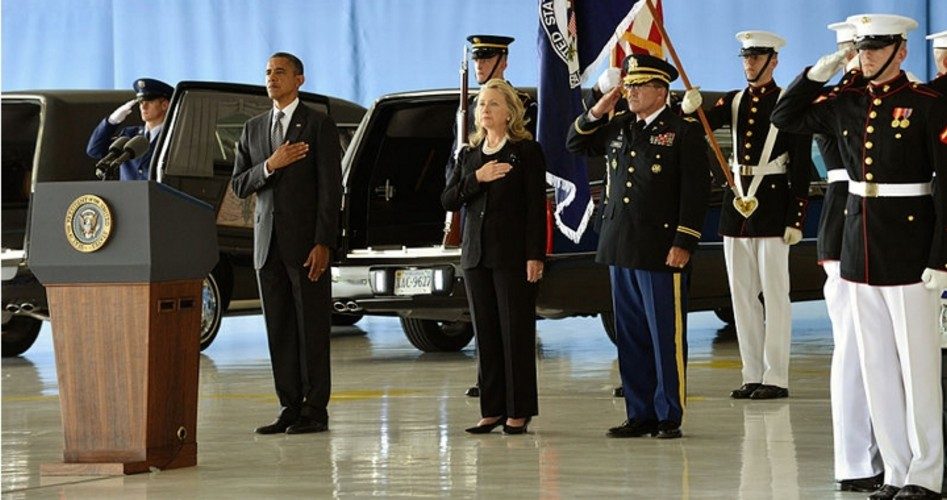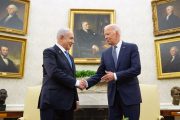
Charges of neglect and coverup during and after the deadly attack on the U.S. mission in Benghazi will be aired today when the House Government and Oversight Committee hears testimony about the September 2012 assault that killed U.S. Ambassador to Libya J. Christopher Stevens and three other Americans.
The hearing will focus on efforts by the Obama administration to characterize the military-style assault as a spontaneous demonstration rather than a planned and coordinated a terrorist attack. Witnesses will include Stevens’ deputy at the time, who has told committee investigators that an Army Special Forces team was ready to attempt a rescue of the diplomats and others under fire in the compound but was ordered to stand down. A State Department official who claims then-Secretary of State Hillary Clinton tried to cut the department’s counterterrorism unit out of the communications loop on the night of the attack will also testify, according to a Fox News report.
Clinton, who resigned as planned in January, has become the focal point of queries into what happened and why during and after the attacks, as well as questions as to why previous requests for additional security at the mission had gone unanswered.
“If Hillary Clinton is not responsible for the before, during and after mistakes… it’s somebody close,” committee chairman Darrell Issa (R-Calif.) told CBS News Monday. “There certainly are plenty of people close to the former secretary who knew, and apparently were part of the problem.”
Clinton subordinates who may have engaged in what Issa called “deliberately premeditated lying to the American people,” could include Under Secretary for Management Patrick Kennedy or Beth Jones, acting assistant secretary for near eastern affairs at the State Department, the chairman said.
Gregory Hicks, deputy chief of the U.S. mission in Libya at the time of the attack, will testify that a Special Forces team was prepared to fly from Tripoli to Benghazi, but the mission was aborted by order of the U.S. Special Operations Command Africa. Hicks was deposed by investigators for the committee and excerpts of the interview have been released by the committee.
Hicks also said that a military aircraft sent over Benghazi might have saved American lives. The U.S. Souda Bay Naval Base is an hour’s flight from Libya. “I believe if we had been able to scramble a fighter or aircraft or two over Benghazi as quickly as possible after the attack commenced, I believe there would not have been a mortar attack on the annex in the morning because I believe the Libyans would have split. They would have been scared to death that we would have gotten a laser on them and killed them,” he testified. Two of the Americans died during the morning mortar attack.
Obama administration officials have denied there was any order to stand down military forces and have insisted that all available military resources were employed. CBS News quoted an unnamed White House official who said Joint Chiefs of Staff Chairman Martin Dempsey and Defense Secretary Leon Panetta “looked at available options, and the ones we exercised had our military forces arrive in less than 24 hours, well ahead of timelines laid out in established policies.”
The attack on the U.S. mission was carried out by militants armed with automatic weapons, mortar, rockets, and grenade launchers. Hicks, who was in Tripoli at the time, said he received a cellphone call from Ambassador Stevens in Benghazi at 9:40 p.m. local time. “We’re under attack! We’re under attack!” the ambassador told him.
“I thought it was a terrorist attack from the get-go,” Hicks said. “I think everybody in the mission thought it was a terrorist attack from the beginning.” He said he was surprised when, five days later, U.S. Ambassador to the United Nations Susan Rice appeared on several network television news shows describing the event as a “spontaneous demonstration” that had been “hijacked” by extremists elements.
Hicks said he called Jones and asked why the ambassador said that. When Jones said she didn’t know in a tone, Hicks said, that indicated “I perhaps asked a question that I should not have asked.” It was later learned that references to terrorism or terrorist attack had been scrubbed from the “talking points” prepared for Rice by the State Department.
Mark I. Thompson, deputy coordinator for operations, will testify that Clinton and Kennedy tried to cut the bureau out of the chain of reporting and decision-making, Fox News reported Monday. Daniel Benjamin, who ran the department’s Counterterrorism Bureau at the time, issued a statement denying the charges.
“I ran the bureau then, and I can say now with certainty, as the former Coordinator for Counterterrorism, that this charge is simply untrue,” Benjamin said. “Though I was out of the country on official travel at the time of the attack, I was in frequent contact with the Department. At no time did I feel that the Bureau was in any way being left out of deliberations that it should have been part of.”
A third witness, Eric Nordstrom, the top security officer in Libya in the months leading up to the attack, testified before the Oversight Committee in a previous hearing last October. Nordstrom at that time expressed his frustration over requests for enhanced security at Benghazi that he said were rejected by State Department officials. “For me the Taliban is on the inside of the [State Department] building,” Nordstrom said.
Aside from the national security questions, the continuing Benghazi controversy carries obvious political implications for the Obama administration and for Clinton, generally considered to be the likely frontrunner for the Democratic presidential nomination in 2016. The attack occurred during a presidential campaign last year, and Issa suggested that political considerations might have been behind the administration’s reluctance to identify the assault on Benghazi as a military attack. Or, he told CBS News, “it could be a general want to believe that we’re closer to the end of the war on terror than right in the middle of it.”
Other Republicans are predicting dire consequences as the investigation unfolds. Both former UN Ambassador John Bolton and former Arkansas Governor and one-time presidential hopeful Mike Huckabee have said the security failure and alleged coverup of the Benghazi events could bring down the Obama presidency before his term is up. In a Facebook message, Sen. Lindsey Graham (R-S.C.) likened Benghazi to the Watergate scandal that forced President Richard Nixon to resign the office.
“I think the dam is about to break on Benghazi. We’re going to find a system failure before, during, and after the attacks,” wrote Graham. “We’re going to find political manipulation seven weeks before an election. We’re going to find people asleep at the switch when it comes to the State Department, including Hillary Clinton.”
Photo of Obama and Clinton at the arrival of the remains of the Benghazi victims



